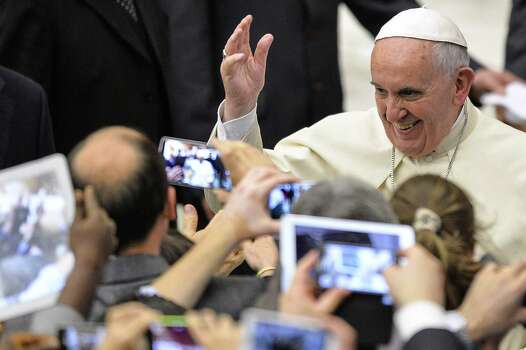
Pope Francis internally divisive, externationally inspirational
BY MICHAEL GERSON : NOVEMBER 19, 2014
Pope Francis’ American honeymoon is over (though the whole idea of a papal honeymoon smacks of Borgia-era excess).
At first, some political conservatives complained that Francis was showing insufficient respect for distinguished Catholic theologians such as Adam Smith and Milton Friedman. But now, more thoughtful Catholic writers wonder if the pope (who conspicuously marries cohabiting couples) is laying the groundwork for more substantive changes on the sacrament of marriage and access to the Eucharist for the divorced and remarried. This, argues Ross Douthat of the New York Times would “sow confusion among the church's orthodox adherents” and raise the (undesired) prospect of “schism.”
Alan: Orthodoxy has always ascribed inordinate centrality to itself. Like all institutions - especially old ones whose origins are obscured by the misty mutability of time - there are few who understand the original inspiration, fewer who believe it and fewer still who practice it. Most people practice religion in their own heterodox ways and those Catholics who think that "cafeteria Catholics" only occupy "the left side of the aisle" might wisely explore the essence of Jesus the Nazarene to see how they actually measure up. "The Thinking Housewife" is a case in point:
"The Thinking Housewife And The Normalization Of America's Only Divorced President"
The event occasioning these concerns was the recent Extraordinary Synod on the Family, which lived up to its billing. The pope invited participants to speak their mind “without fear,” which revealed a series of divisions between the theological left and right, as well as between the developed and the developing worlds. “Francis,” says journalist Christina Odone, “achieved miracles with his compassionate, off-the-cuff comments that detoxified the Catholic brand. He personifies optimism — but when he tries to turn this into policy he isn't in command of the procedures or the details. The result is confusion.”
This seems to be the main concern of Catholic traditionalists: confusion. Francis is cultivating debate within the church about an essential social institution — and the value of relationships outside it — even as that institution is under assault by the world (at least where the sexual revolution continues its relentless march). In the middle of an important cultural conflict, Francis sounds an uncertain trumpet.
The pope himself seems unconcerned, continuing his unpredictable riff. He embraces the Big Bang. He appears in selfies. He criticizes euthanasia. He invites Patti Smith, the godmother of punk, to perform at the Vatican. He cashiers opponents. He calls the Kingdom of God “a party” (which is precisely how the founder of the Christian faith referred to it). He is a man, by his own account, with no patience for “sourpusses.”
As a Protestant, I have no particular insight into the internal theological debates of Catholicism. But the participants seem to inhabit different universes. One side (understandably) wants to shore up the certainties of an institution under siege. Francis begins from a different point: a pastoral passion to meet people where they are — to recognize some good, even in their brokenness, and to call them to something better. That something better is not membership in a stable institution, or even the comforts of ethical religion; it is a relationship with Jesus, from which all else follows
Instead of being a participant in a cultural battle, Francis says, “I see the church as a field hospital after battle.” First you sew up the suffering (which, incidentally, includes all of us). “Then we can talk about everything else. Heal the wounds.” The temptation, in his view, is to turn faith into ideology. “The faith passes,” he recently said, “through a distiller and becomes ideology. And ideology does not beckon (people). In ideologies there is not Jesus; in his tenderness, his love, his meekness. And ideologies are rigid, always. . . . The knowledge of Jesus is transformed into an ideological and also moralistic knowledge, because these close the door with many requirements.”
The message seems simple. It actually highlights a complexity at the heart of Christianity. Its founder coupled a call for ethical heroism (don't even lust in your heart) with a disdain for institutional religion and self-righteous clericalism. And this has been disorienting to institutionalists from the start.
Francis has devoted serious attention to reforming the institutional expression — particularly the finances — of the Catholic Church. But he has chosen to emphasize the most subversive and challenging aspects of Christian faith. He really does view rigidity, clericalism and hypocrisy as just as (or more) damaging as sexual matters. Liberals want to incorporate this into their agenda. But the pope has his different agenda — which has nothing to do with our ideological debates. It is always revolutionary, and confusing to the faithful, when a religious leader believes that the Sabbath (including all the rules and institutions of religion) was made for man, and not the other way around.
Perhaps Francis is destined to be a divisive force within his church and an inspiration outside it (a theory that may be tested during his upcoming American visit). But I am inclined to defend his influence with all the zeal of a non-convert. While popes may or may not be infallible, this one is marvelously wise and human.
michaelgerson@washpost.com
No comments:
Post a Comment